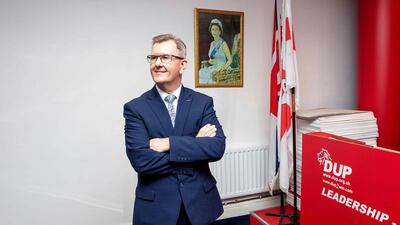The next leader of Northern Ireland's Democratic Unionist Party has warned stability in the province is not guaranteed unless post-Brexit trade rules are changed.
Jeffrey Donaldson's unopposed nomination will make him the third person in a tumultuous few weeks to lead the DUP during crucial talks about the trade arrangement known as the Northern Ireland Protocol.
His nomination comes after after internal divisions forced leader Edwin Poots to resign last week.
Mr Donaldson pledged to pressure Prime Minister Boris Johnson's government to ditch the rules which effectively treat Northern Ireland as part of the EU for customs purposes.
"I will be speaking with (Johnson) at the earliest opportunity to emphasise that it is not realistic to expect stability when every unionist representative in the devolved institutions opposes the Northern Ireland Protocol," he said.
"The government and those who claim to be protectors of peace and stability must step up and deal with the protocol in a manner which respects the constitutional and economic integrity of the UK."
DUP lawmakers ousted then leader and Northern Irish First Minister Arlene Foster in late April in favour of Mr Poots, who stepped down after just three weeks in the role.
Mr Donaldson's candidacy will be formally ratified by party officials next week.
The leadership changes have added to political instability in Northern Ireland, which still faces the threat of a snap election over a row between the DUP and Irish nationalist rivals Sinn Fein over the introduction of Irish language rights.
The two parties make up a power-sharing executive, put in place by the 1998 peace deal that ended 30 years of sectarian violence in Northern Ireland.
Mr Donaldson, a long-standing DUP MP who is their chief in Westminster, said on Monday that failure to deal decisively with the protocol would have consequences for that arrangement.
The protocol was tailor-made to avoid politically sensitive checks on goods from Ireland crossing the UK's only land border with the EU. But it is deeply unpopular with supporters of the union with Britain because it has created trade barriers with the rest of the UK.
Ms Foster was accused of allowing customs controls to be put in place for goods coming from mainland Britain, creating a border.
Mr Poots was brought down by anger in his camp after last-minute concessions to Sinn Fein.
Before being forced out, Mr Poots appointed loyalist Paul Givan as the province's First Minister, a role he assumed on Thursday but will be under pressure to relinquish.
Mr Donaldson, 58, is a veteran of UK politics, holding the title of the longest-serving MP in Northern Ireland.
He was born in Kilkeel in Northern Ireland and entered politics after the murder of his police officer cousin Samuel Donaldson during the Troubles – the first policeman to be blown up by the IRA in the conflict.
In 1985, he was elected to the Northern Ireland assembly aged 22, the youngest person to win a seat at Stormont.
He was originally a member of the Ulster Unionist Party.
However, his relationship with the party soured after its leader David Trimble helped negotiate the Good Friday Agreement.
Mr Donaldson led a walkout of the peace talks after opposing the early release of republican prisoners.
He left the party along with Ms Foster, both joining the DUP.
If elected, Mr Donaldson would be faced with rising tensions in the UK province of about 1.9 million people.
Unionists are upset about the Northern Irish protocol negotiated as part of Brexit, which they say threatens the province's place in the UK.
Aimed at avoiding a physical border between the Republic of Ireland and the North, the agreement keeps the province in the European single market and customs union for goods.
The Northern Ireland protocol was the "number one issue", Mr Donaldson said and promised he would "ensure that the government doesn't just listen but recognises the need to take decisive action".
"Now, more than ever, we need to unite in the face of the threats posed to Northern Ireland by the protocol," he said.
Mr Givan promised he would support Mr Donaldson as leader.


